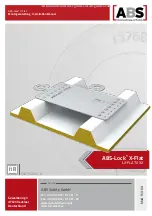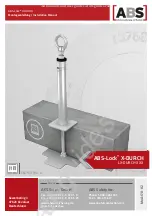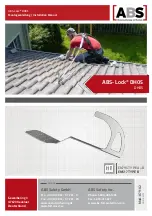
16
AUTOCOM PRO MDX1400
The experienced user will be in a position to specify parameters while in bypass mode and thus realize the
effect before the unit is actually switched into operation. This is important in live situations, where a signal
needs to be managed efficiently by the engineer, without the convenience of continual A/B comparison.
For using the AUTOCOM PRO as a Limiter, you should set RATIO to oo:1, INTERACTIVE to off and use short
Attack and max. Release Times. Use the THRESHOLD control to set the threshold level for limiting.
3.3.2 The AUTOCOM PRO As A Sound Effects Unit
In the early 1960s, musicians began looking at the recording process as a way to create new sounds. The
pumping effect which had been avoided by earlier engineers suddenly became fashionable and was utilized as
a creative tool, laying the groundwork for many of the sounds which are now considered indispensable in
contemporary music. The compressor is used in this role because you can hear it working, and control of the
dynamic range is of secondary importance.
The BEHRINGER AUTOCOM PRO, with its extensive range of functions, is well suited to this application.
Sound effects of this kind can be achieved using extreme settings. To achieve this, set the THRESHOLD
control to a fairly low level, the RATIO control to almost maximum and use the ATTACK and RELEASE
controls to obtain the desired effect. Experiment with all the controls in order to get a feel of their function!
3.3.3 The Muffling Effect Of A Compressor
Quite often, compressors are sometimes accused of muffling the sound, whilst at the same time reducing the
dynamics. This fact should be investigated further. Bass frequencies contain most of the energy within music
and therefore cause the compressor to reduce the overall dynamics. If the music also contains high
frequencies along with the bass frequencies, these are also reduced in level. This is the reason why: in an
extremely compressed recording of drums, the cymbals and high-hats are acoustically swamped by the sound
of the snare or the bass drum. The same effect is experienced when processing reverberated or ambient
sounds. The solution commonly used to this basic problem is either to reduce the compression ratio or to slow
down the attack time, so that the increasing high frequency transients pass through the compressor
unhindered before the compressor takes effect.
The AUTOCOM PRO MDX1400 offers a solution to this problem that is by much more elegant. The SC Filter
switch allows you to activate a highpass filter in the control signal path of the compressor. This filter makes
sure that midrange and treble range frequencies are taken into account to a greater extent, and that a
low-frequency signal triggers less compression than a midrange/treble signal of comparable level. A major
advantage of this design can be seen in the fact that the frequency response of the overall signal is not modified
below the threshold adjusted with the Threshold control.
In pop music the dynamics of both kick drum and bass guitar are usually processed individually. The sidechain
filter is therefore ideally suited to apply overall compression in the mixdown, to compress the music while
increasing its loudness, but without having to accept the drawbacks described above.
3.4 Dynamic Enhancer Section
In addition to the above mentioned method with the sidechain filter the AUTOCOM PRO offers another
alternative solution: the Dynamic Enhancer. It eliminates the problems without creating any additional negative
side effects. As the signal level rises towards the threshold point where compression will occur, high frequency
enhancement is added at the same degree to which the input signal is compressed. The AUTOCOM PRO
accurately tracks the amount of compression in order to compensate with the same amount of dynamic
enhancement, even if there are heavy signal variations. When there is no compression taking place, the
Dynamic Enhancer is inoperative and therefore, no additional noise or signal equalization is added to the
signal. For more versatility, a PROCESS control allows you to control the available amount of dynamic
enhancement. The range lies between Off and 6.
The typical dynamic enhancement function is shown in the following figure:
3. APPLICATIONS
Downloaded from
www.Manualslib.com
manuals search engine













































